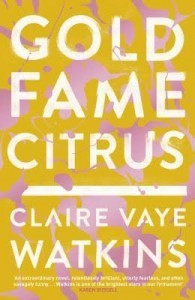Gold Fame Citrus by Claire Vaye Watkins
 I adore speculative fiction. Show me a post-disaster scenario or near future alternative society and I’m all over it, as they say. Given the puffs on the cover for the author’s first book of short stories, Battleborn, and knowing only that this novel is set in a near-future California that is being reclaimed by desert, I was wondering if this novel might be this year’s Station Eleven. Emily St. John Mandel’s post-flu-pandemic novel which I loved, was an elegant and thoughtful addition to this sub-genre. Or, would it be more Ballardian? (cf Drowned World ?) Well, there are similarities: a travelling community, charismatic leaders, madmen and a disturbing sense that it could actually happen to pick out a few.
I adore speculative fiction. Show me a post-disaster scenario or near future alternative society and I’m all over it, as they say. Given the puffs on the cover for the author’s first book of short stories, Battleborn, and knowing only that this novel is set in a near-future California that is being reclaimed by desert, I was wondering if this novel might be this year’s Station Eleven. Emily St. John Mandel’s post-flu-pandemic novel which I loved, was an elegant and thoughtful addition to this sub-genre. Or, would it be more Ballardian? (cf Drowned World ?) Well, there are similarities: a travelling community, charismatic leaders, madmen and a disturbing sense that it could actually happen to pick out a few.
Gold Fame Citrus, (more about that title in a mo), is the story of lovers Ray and Luz and is centred in a near-future California that’s been systematically dried out, there is no water left. Ray and Luz had been hiding out up in one of the canyons in a former starlet’s mansion. When, on a trip for supplies down into LA, they’re left with a baby girl who calls herself Ig to look after, they opt to take her with them.
Those remaining in California are either being left behind in a sort of hippy daze, or are being chased inland by the encroaching sand known as the Dune Sea. Ray and Luz had been planning to stay, as Ray says:
‘Some people I know have a place. Even if they didn’t, Hoosiers [Native of Indiana] aren’t quitters. California people are quitters. No offense. It’s just you’ve got restlessness in your blood.’
‘I don’t,’ she said, but he went on.
‘Your people came here looking for something better. Gold, fame, citrus. Mirage. They were feckless, yeah? Schemers. That’s why no one wants them now. Mojavs.’
He was kidding, but still the word stung…
… But Ray smiled and his kind mouth once again soothed Luz. ‘We’re stick-it-out people,’ he said, but what he really meant, she knew, was they could be Mojavs together.
However, once they take on Ig, who is not quite two, they realise that they will need to move to find a life for this little girl – besides Nut may come back for her. There are funny moments when Luz improvises a nappy from a sanitary towel held in place with a psychedelic Hermès scarf and they use a birkin (see here) as a changing bag.
Eventually they set off inland for the state border, but they get lost on the road towards the camps. Running out of fuel, Ray goes for help, leaving Luz and Ig in the car – where they are found by Levi, the legendary dowser and leader of a travelling community which moves just ahead of the Dune Sea. Luz, as a former model and failed actress, realises she has a part to play and, as acting mother to Ig, that is of ‘a good woman’. But, I don’t want to tell any more about the plot which has a way to go with some surprising twists and revelations.
The author’s language can be beautiful and poetic, it is also fragmentary, not necessarily easy to read and full of American vernacular unfamiliar to UK readers plus other unusual words like ‘cespitose’ – growing in clumps like grass – I had to look it up.
She does like a list a little too much, although some of them do read like almost like poems – Ray’s daily to do lists for instance. There is a sadness too in her list of landmarks, both notable and ones that’ll never be missed, ‘buried beneath:’ the Dune Sea, but others like Ray and Luz’s word associations are just superfluous.
Sometimes though, it just tries too damn hard:
‘Ray’s environment had failed to indoctrinate him in the ways of subjugation, making him essentially impervious to hegemony.’
However, the luminous descriptions of the desert landscape and the heat coming from it are glorious, yet deadly. The characters of Ray and Luz are well-drawn. Despite a leisurely first half, this couple will reel you in and keep you reading towards some surprise developments later on.
It’s not perfect, it’s overwritten, but I enjoyed this very hippyish post-disaster novel. (8.5/10)
* * * * *
Source: Review copy.
Claire Vaye Watkins, Gold Fame Citrus (Quercus, Jan 2016) Hardback, 352 pages.


2 thoughts on “The end of California dreaming?”